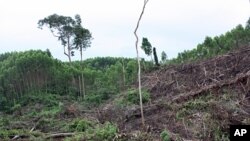Several villages in Indonesia want to reject millions of dollars of international aid to run a forest conservation project near their homes. They are concerned that efforts to stop deforestation will prevent their communities from using the land for subsistence, as they have for generations.
Ten women sit in a circle on the ground by a wooden-slat hut, using mortars and pestles to crush ginger and garlic. They are helping a neighbor prepare for her daughter's upcoming wedding in the village.
Thirty-three-year-old Nordia says that she can help her neighbor because she does not have to work today. She collected enough sap from rubber trees in the forest yesterday to sell at the market. The money will last her family for a week.
She says that the community needs the forest to live, to build homes. She says they need the leaves and other resources from the forest, as well as the land for agriculture.
This is Lubuk Beringin – a river village of about 600 people in Jambi province on the Indonesian island of Sumatra. All of the modest huts here are made of wood from the forest and the village is powered by the river, using a microhydro mill.
But this community's traditional way of life is threatened by deforestation and development. Jambi province has lost two-thirds of its primary forest, largely because of illegal logging and land clearing for lucrative palm oil plantations.
What is happening in Jambi province is part of growing national and international environmental concern. According to the environmental organization Greenpeace, Indonesia has one of the fastest deforestation rates in the world – losing 51 square kilometers of forest every day. The burning of forests has also contributed to Indonesia's status as the world's third-largest producer of greenhouse gas emissions.
The Australian-run project comes under a U.N.-backed program, Reducing Emissions from Deforestation and Forest Degradation, called REDD, in which developed countries can offset their carbon emissions by paying poorer nations to protect their forests. The district of Merangin is one of five sites the Australian government is surveying for its REDD project.
Here in Lubuk Beringin village, most people do not know that their forest is a potential project site.
Neil Scotland, the project's manager from the Indonesia-Australia Forest Carbon Partnership, says that the program is in its early stages. He ensures that communities will be consulted.
"What we propose to do in Jambi is, begin with a wide process of consultation – look at how we can support existing needs," Scotland said. "Local people's needs and aspirations, how to manage forests and how to manage forest resources. And ensure that REDD is compatible with those needs."
But Nordia, like many people in her village, does not want money or interference from the government.
She says her village does not want Australia to protect the forest because the community has the right to use it. She says the forest is for Lubuk Beringin.
To be able to officially claim rights to the land, Lubuk Beringin and two neighboring villages are lobbying the Forestry Ministry to categorize the area as a village forest. That would keep companies off of the land for 35 years.
Musri Nauli, a board member of Jambi's Friends of the Environment, says that naming the area a village forest is the best way to protect it.
He says that the communities in Merangin already protect and manage their forests and that other countries cannot expect to just come in and protect the forest better than locals themselves.
Last year, after a logging company's 20-year concession to the land expired, Lubuk Beringin and two neighbor villages passed local laws stipulating what and how much could be taken from the forest. Local leaders have nailed signs to trees to remind people how to sustain the forest.
Other leaders are more open to international help. Aidil Putra, head of the Jambi Farmers Union, says his community would welcome international intervention, if it helped prevent forest conversion for large-scale commercial use.
He says that, if the people of Jambi agree to the terms of a project with Australia, then Australia can help them defend their land against big companies.
While the future of Merangin's forest hangs in limbo, a two-year moratorium on new forest concessions in Indonesia buys the community a little time.
The freeze was announced in May by President Susilo Bambang Yudhoyono, in a $1 billion REDD program agreement with Norway that has pledged the money to offset its carbon emissions. The moratorium is expected to begin next year, but companies with existing permits can continue logging as usual.
